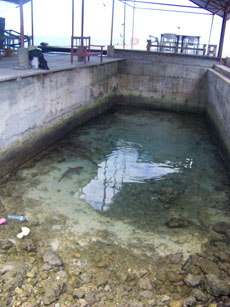Former Director General of the Environmental Protection Authority (EPA) Mohamed Zuhair had given notice that he intended to participate in the government’s voluntary redundancy program three weeks before his sudden departure last week, Environment Minister Mohamed Aslam has revealed.
Zuhair resigned publicly stating that his departure was due to “political interference” in the EPA’s fining of local business tycoon Mohamed ‘Champa’ Moosa – the owner of opposition-leaning private broadcaster DhiTV – for conducting dredging and reclamation works around Thun’bafushi without an Environmental Impact Assessment (EIA).
Photos obtained by Minivan News, corroborated by the eyewitness accounts of foreign experts, suggested that Thun’bafushi had been used as a dump site, with piles of old machinery, oil drums and used car batteries rusting in the sun. At the time the photos were taken, a number of sharks were also being kept in a concrete tank containing less than a foot of tepid water.
The EPA labelled Champa an “environmental criminal” and fined him the maximum penalty of Rf100 million (US$6.5 million) after the EPA assessed damage to the area as amounting to Rf2,230,293,566 (US$144.6 million), under new enforcement regulation introduced in February.
“Thun’bafushi has been an issue long before we took office,” Aslam told Minivan News, explaining that the previous administration had initially rented the island to Champa for Rf 100 a year (US$6.40) under an agreement that stipulated that he “not do anything detrimental to the environment – he was allowed to grow trees and monitor the shifting of the islands. He was not allowed to reclaim or extend the island.”
However Champa had conducted these works without ever submitting an EIA, Aslam said.
“The area has been surveyed 2-3 times now, and last year the Director General attended himself a survey to assess the cost of the damage.”
The government had on several occasions asked Champa to explain himself, and he had corresponded with the EPA, Aslam said.
“Champa disputes he has done anything illegal, and states that has done everything according to the initial agreement.”
Champa’s lawyer, Aslam noted, “a professional with a background in island morphology”, had claimed that the Maldives did not have the capacity to do an accurate assessment.
Champa has yet to appeal the EPA’s formal issuance of the fine, Aslam said, “and it is up to him to take the matter to court.”
Aslam disputed Zuhair’s parting public accusation that the government had interfered in the fining of Champa, noting that several resort properties had also been fined for unapproved reclamation works.
“We know this accusation to be inaccurate,” Aslam said, explaining that Zuhair had expressed his decision to take the voluntary redundancy package three weeks ago.
The Asia Development Bank (ADB)-backed redundancy incentive program offered lump sums of up to Rf200,000 (US$13,000) as well as scholarships and preferential SME loans to civil servants in an attempt to downsize the state budget. The deadline for applications was May 31.
Zuhair’s decision to apply for the program had caught the government by surprise, Aslam said, explaining that he had met with the EPA’s Director General to try and retain him.
“His reason was that government pay was not meeting his financial needs, and he was looking to move to the private sector. We offered to move him to another department that would allow him to also work in the private sector – which is not allowed under the EPA’s regulations.”
Aslam said he became concerned when he pressed Zuhair for an explanation, “but he said on this matter he couldn’t tell us anything further.”
“We asked asked him then if this was a matter of national security, but he said no. So we respected his decision, and he submitted [the voluntary redundancy forms] with the Ministry of Finance, and we were just about to sign them – my signature was to be the last.”
Around this time Zuhair was allegedly sent a letter containing a mobile phone SIM card and a slip of paper note requesting he use it to call Nawal Firaq, the CEO of DhiTV.
Minivan News understands the letter containing the note and SIM card, registered in the name of a Bangladeshi labourer, was delivered to Zuhair’s flat on Friday morning but instead found its way to police.
Firaq denied knowledge of the letter when contacted by Minivan News.
In the police inquiry subsequent to his resignation Zuhair cooperated with police but denied any knowledge of receiving the letter.
“This is Champa building his court case by attempting to question the independence of the EPA,” Aslam suggested, noting that as the EPA’s Director General, Zuhair’s signature was on all the correspondence with Champa, including the notice informing him of the fine.
Despite Zuhair’s expressed financial concerns, his sudden resignation following the fining had meant he had forfeited his entitlement to the redundancy package he had applied for, Aslam noted.
“The numbers don’t add up,” he said.
The EPA’s Director Ibrahim Naeem told Minivan News that neither he or the EPA had received any communication from Zuhair following his sudden resignation.
“I heard his words on television, and some of them did not match his actions,” Naeem said. “He was the guy who signed the letter [fining Champa]. Why would he have done so if he was not happy about it?”
As to why Zuhair would have resigned before receiving his resignation chit from the civil service commission, “that is a very big question, and the answer is not very clear.”
Minivan News has sought to contact Zuhair for several days in regards to his resignation, but his phone appears to have meanwhile been switched off. The EPA and the Environment Ministry have also reported difficulties contacting him.
Minivan News also sought response from Champa but he was not responding to calls at time of press.
Likes (0)Dislikes
(0)Dislikes (0)
(0) 

